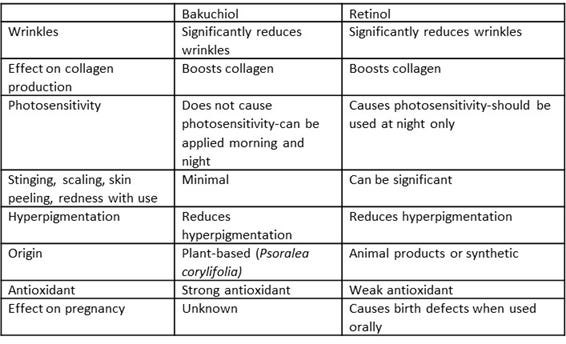Bakuchiol: a retinol-like ingredient for the rest of us
Today we’ll shine the light on a promising new cosmetic ingredient, an ambitious newcomer, the one that has shown retinoid-like results, without many of their undesired side effects. Intrigued? Good, let’s get to it.
The molecule in question is bakuchiol. When we said it was new, we meant to say, new to skincare. Bakuchiol has been used for centuries in traditional Chinese, Indian, and Peruvian medicine. It is found in the seeds of babchi plant (Psoralea corylifolia), as well as a handful of others. When it comes to effects in skincare, its results are very promising.
Structurally, it has nothing in common with retinol or any of its derivatives. Despite that, when used in cosmetics, it behaves as a functional analog of retinol. With one important distinction: it is much gentler on skin. Retinol, in addition to its impressive list of benefits for skin, has a list of drawbacks, too, and should be used with caution (read about that here). Because it can cause photosensitivity of skin, it should be used only at night. For the same reason, you are well-advised to use sunscreen during the day. It can cause dryness and peeling of the skin. Bakuchiol, on the other hand doesn’t have that issue, so it can be used both morning and night. The reports of bakuchiol sensitivity are extremely rare. Bakuchiol is a potent antioxidant, twice as strong as vitamin E, and as such can protect skin from oxidative stress.1
In a direct comparison, summarized in the table below, retinol and bakuchiol have similar benefits-they both reduce the surface area and depth of wrinkles and make skin brighter.2,3 While the two molecules displayed similar effectiveness, the bakuchiol group reported far fewer scaling, peeling, redness, and stinging than the retinol group. It has to be said that in the studies we have seen, retinol was applied only once per day, at night, while bakuchiol was applied both morning and night-per application, it follows that retinol is obviously more effective. However, given that many people cannot use retinol every night (due to dryness, etc. that it can cause), bakuchiol-based skincare routine might be easier to adhere to. Those of you who care about the origin of your cosmetics, know that bakuchiol is a plant-based molecule, whereas retinoids are either of animal- or synthetic origin.
What about the truly scary side effect of retinol, namely on the babies in the womb? The harmful effects of retinol were discovered through oral use to treat acne during pregnancy. Is bakuchiol safe in that regard? In short, we don’t know-there are no reports we know of that show that bakuchiol is harmful in that way, or those that prove its safety in pregnancy. Given its wide use in Asian traditional medicine, it wouldn’t surprise us if it turned out to be safe.* As with all chemicals, however, the dose makes the poison. In face creams, it is usually formulated for up to 0.5%.
At Dr Lasio Cosmetics we are in love with our own formulation of bakuchiol and niacinamide (vitamin B3). It combines a very effective retinoid-like ingredient with the equally important vitamin that increases skin barrier function, and a host of other benefits. On that note, we want to share the basis of a very sound skincare routine: The combination of:
· Vitamin C, E and ferulic acid serum.
· Bakuchiol/niacinamide moisturizing cream
· A mineral sunscreen
forms a regiment that will serve many people with diverse skin needs. It delivers on multiple fronts:
· Antioxidants (which fight the damage of UV rays and pollution)-we wrote about their magical interplay here-vitamins C, E, and ferulic acid; bakuchiol;
· Skin barrier properties improvement-vitamin B3 (niacinamide);
· Collagen production boost-vitamin C**, bakuchiol;
· Reduces hyperpigmentation-vitamin C, vitamin B3, bakuchiol;
· Reduces inflammation, redness, acne-vitamin B3, vitamin C;
· Reduces wrinkles-vitamin C, bakuchiol, vitamin B3;
…and achieves all this without active ingredients with questionable safety profiles. The ingredients outlined above will make your skin look better. Based on numerous studies in the literature, plenty of anecdotal evidence, and personal experience, we are confident in making such a bold claim. More importantly, they will improve the health of your skin, in terms of lessening and countering UV damage and reducing inflammatory skin conditions.*
Whether you choose retinol or bakuchiol, or other ingredients listed above, will rest on personal preference, tolerance, familiarity with the product/brand, and your lifestyle. When it comes to cosmetics, retinol has been around much longer than bakuchiol, and has been studied a lot more-that may be a feather it its hat. If you spend a lot of time in the Sun, or have sensitive skin, bakuchiol products may be better for you. We hope that the list above, or articles such as this one serve as a guide for an informed decision about what you put on your skin.
Disclaimer: *None of this is medical advice
**While vitamin C, when applied topically has many benefits (UV protection, wound healing, skin brightness, etc.), the vitamin C that helps make collagen in your skin comes from your diet, not your creams. That’s because vitamin C applied topically doesn’t penetrate the skin deep enough to where collagen synthesis occurs. Rather, it is brought there, to your dermis, via blood vessels. So, eat your fruits and veggies! They truly are good for you.
References
1. Applications of bakuchiol in dermatology: Systematic review of the literature. Journal of Cosmetic Dermatology, 2022, 21, 6631-6643.
2. Prospective, randomized, double-blind assessment of topical bakuchiol and retinol for facial photoageing. British Journal of Dermatology 2019, 180, 289-296.
3. Multidirectional activity of bakuchiol against cellular mechanisms of facial ageing-Experimental evidence for a holistic treatment approach. International Journal of Cosmetic Science, 2022, 44, 377-393.


